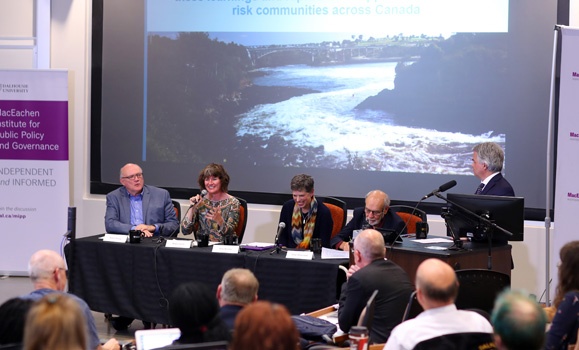As evidence grows about the negative impacts of a changing climate, so too does public pressure on policy makers to do more to combat it.
But as a panel discussion with well-known climate experts at Dalhousie last week made clear, there are few easy solutions to such a complex problem — particularly one that raises uncomfortable questions about existing behaviors.
"Values are harder to change than knowledge," said panelist Kate Sherren, an associate professor and academic program coordinator in Dal's School for Resource and Environmental Studies.
Dr. Sherren was speaking at the standing-room-only session titled, Resilience or reluctance: Climate change adaptation policy in Atlantic Canada, which is part of the Policy Matters series, a weekly panel discussion on major policy issues presented by the MacEachen Institute for Public Policy and Governance. Last week’s session was hosted in partnership with the Marine Environmental Observation Prediction and Response Network (MEOPAR).
On the panel were Omer Chouinard, professor emeritus at the Université de Moncton; Megan Leslie, president and CEO of World Wildlife Fund Canada; Dr. Robert Strang, Chief Medical Officer of Health in Nova Scotia; and Associate Professor Kate Sherren from the School for Resource and Environmental Studies. The speakers were moderated by Blair Feltmate, head of the Intact Centre on Climate Adaptation at the University of Waterloo.
A change in thinking
As each of the presenters took the podium for their 10 minutes and shared their experiences working with and developing policies that relate to climate adaptation, it became clear that our current ways of thinking are holding us back from meaningful transformation.
First to speak was Omer Chouinard who outlined the importance of community involvement in developing locally adapted strategies that reflect the concerns of the stakeholders but cautioned that it was necessary to ensure the goals of the project are clear.
“It’s very important, at the beginning, to say that we’re not just here to look at the one aspect but the overall,” he said. “Sometimes it’s not easy because they want to focus on their problem.”
Dr. Sherren spoke of our tendency toward “climax thinking” or the idea that we have somehow reached an epitome or a destination instead of acknowledging that change is constant. She observed that, “by trying to hold our own landscape in stasis, we only pass the impacts and costs of our decisions … on to others, in other places.”
While discussing how climate change impacts human health, Dr. Robert Strang talked about the need to move beyond the way things have always been done so we can introduce a more comprehensive plan that focuses on meeting the needs of our most vulnerable.
“The planning and the thinking has to be multisectoral, engaging community at all levels, not just relying on our emergency responders who are going to pick up the pieces when something happens,” he said. “It’s much more complex than that.”
Megan Leslie was last to speak and while her work is focused on the biodiversity crisis — 50 per cent of species in Canada are on the decline by an average of 83 per cent — she believes it intertwines with the climate crisis.
“One third of our global greenhouse gas emissions come from the destruction of nature,” she said. “By focusing on green infrastructure, we can help ensure communities are more resilient, that they are resilient into the future, and we can also bring back that habitat so wildlife can thrive.”
Collective action
The speakers all seemed to conclude that we can’t rely on the thinking that got us here to solve these new problems. We need to leverage policy to ensure we move forward collectively instead of relying on our individual sense of responsibility.
As Dr. Sherren observed, “our individual fallacious thinking can put us in bit of a bubble — make us feel like it’s actually someone else’s problem first, always, to make a change, whether it’s a change toward mitigation or a change toward adaptation, but of course, it can’t be that. It can’t always be just about us.”
Policy Matters panel discussions are open to everyone and held Tuesdays through November 19, in room 1020 of the Kenneth C. Rowe Management Building at Dalhousie, from 12:00 pm – 1:30 pm. This week’s panel is titled, A Key Determinant of Health: Meeting the Housing Needs of Older LGBTQ2S+ Canadians.
Comments
comments powered by Disqus

